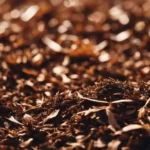Vinegar, a common household item, is known for its versatility ranging from culinary uses to home cleaning. In the realm of gardening, vinegar has gained attention as a natural herbicide. This article explores the potential of vinegar in controlling tree roots, a concern for many gardeners dealing with invasive root systems.
Vinegar and Its Properties
Vinegar primarily consists of acetic acid and water. The acetic acid concentration varies among different types of vinegar, with household vinegar typically containing around 5% acetic acid. This acidity is what gives vinegar its herbicidal properties, making it effective in killing certain types of weeds and grasses. However, the effectiveness of vinegar in dealing with more robust plant growth, such as tree roots, requires a closer look.
The Effectiveness of Vinegar on Tree Roots
Surface-Level Efficacy
Vinegar’s herbicidal action is most effective on young, surface-level roots. When applied directly, vinegar can cause quick dehydration of these roots, leading to their demise. However, vinegar’s effectiveness diminishes with mature or deep-rooted systems. Since tree roots often extend far below the surface, vinegar may not reach these deeper roots, reducing its overall efficacy in controlling established trees.
Concentration and Application
The concentration of vinegar is a critical factor in its effectiveness. Regular household vinegar, with a 5% concentration, might not be strong enough to impact tree roots significantly. Horticultural vinegar, which has a higher concentration of acetic acid (up to 20%), can be more effective but must be handled with greater caution due to its corrosive nature.
Application methods also play a crucial role. For surface roots, direct application of vinegar may be practical. However, for deeper roots, simply pouring vinegar on the ground is unlikely to be effective. It may require methods to deliver vinegar closer to the roots, though this can be challenging and less practical for deep-root systems.
Comparing Vinegar to Other Root Control Methods
Chemical Herbicides
Chemical herbicides are commonly used for controlling tree roots. These herbicides, which often contain glyphosate or triclopyr, can be effective against a wide range of plants, including deep-rooted trees. However, compared to vinegar, chemical herbicides pose greater risks to the environment and surrounding vegetation. They can leach into the soil and waterways, potentially causing harm. Vinegar, being a natural product, is often perceived as a safer, eco-friendlier alternative, though its effectiveness is more limited.
Mechanical Removal
Mechanical removal involves physically cutting or digging out tree roots. This method can be very effective, especially for larger, established roots. However, it is labor-intensive and can disturb the surrounding landscape. Vinegar offers a less disruptive alternative, though it’s significantly less effective for deep or large roots.
Natural Alternatives
Other natural alternatives for root control include boiling water, salt solutions, and essential oils. Like vinegar, these methods are environmentally friendly but vary in effectiveness. They are generally more suitable for small-scale, surface-level root issues and may not provide a viable solution for larger tree root systems.
Risks and Considerations
Potential Damage to Soil and Plants
Using vinegar, especially in high concentrations, can lower the pH of the soil, making it more acidic. This change in pH can negatively affect the soil health and the growth of nearby plants. Additionally, indiscriminate use of vinegar can harm beneficial soil organisms and desirable plants in the vicinity. It’s crucial to apply vinegar carefully, targeting only the unwanted roots to minimize collateral damage.
Safety Precautions
When using vinegar for root control, especially horticultural vinegar with high acetic acid content, safety precautions are necessary. Protective gear such as gloves, goggles, and a mask should be worn to avoid skin burns and inhalation risks. It’s also important to consider the environmental impact. Vinegar can runoff and affect nearby plants and aquatic systems, so it should be used responsibly and sparingly.
Practical Application Tips
For those considering using vinegar for tree root control, here are some practical steps and tips to enhance its effectiveness while minimizing risks:
- Identify Target Areas: Clearly identify the roots you wish to treat. Remember that vinegar can affect nearby plants, so precision is key.
- Choose the Right Vinegar: For more robust roots, horticultural vinegar (20% acetic acid) may be more effective than household vinegar. However, handle with care due to its corrosive nature.
- Apply Directly to Roots: Apply the vinegar directly onto the roots you want to treat. Using a spray bottle or brush can help target the application and reduce waste.
- Repeat Applications: One application may not be sufficient. Plan for multiple treatments, especially for thicker roots. Monitor the area and reapply as needed.
- Best Time for Application: Apply vinegar during dry weather to ensure it remains concentrated at the application site and doesn’t get diluted by rain.
- Protect Desirable Plants: Shield nearby plants you wish to keep with plastic covers or barriers while applying vinegar.
- Soil pH Monitoring: If you’re using vinegar repeatedly, monitor the soil’s pH to ensure it doesn’t become too acidic for other plants in the area.
Conclusion
Vinegar can be a tool for controlling tree roots, particularly at the surface level. However, its effectiveness is limited compared to mechanical removal methods or chemical herbicides, especially for deep or large roots. While vinegar is a more environmentally friendly option, it requires careful handling and consideration of its impact on soil health and surrounding vegetation.
For gardeners exploring natural and less aggressive methods of root control, vinegar offers a potential solution, albeit with limitations. As with any gardening practice, responsible use, understanding the constraints, and observing the outcomes are essential. Ultimately, the choice to use vinegar for tree root control should be informed by the specific situation, the scale of the problem, and a commitment to sustainable gardening practices.




